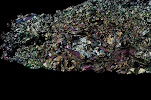* Don’t submit the manuscript to a publisher before it has been edited for grammar, spelling, punctuation, and clarity of communication.
* Read the text you’ve written out loud in order to find places with awkward phrasing, unclear sentences, and bad grammar.
* If you do submit a manuscript full of errors and they send you back a review suggesting that there are major problems with the document don’t wait to tell your co-author, who speaks English as a native language, until six days before the revised manuscript is due to be turned in. Properly cleaning up that many problems with a document really takes more time than that.
* Don’t attempt to keep track of citations by hand, use a reliable program designed to keep track of citations for you.
* If you do attempt to do citations by hand, include the list of cited papers when you send the manuscript to your co-author so that she will have something to work with when converting the document to using her citation-tracking program of choice.
* If you attempt to do citations by hand, be consistent in the format you use—do not switch between ALL CAPS for some author names and normal capitalization for others. (Really, one should just use a program to take care of the citations—the time it takes to learn to use one is well rewarded with the consistent results.)
* Once you send the list of references to your co-author, it should actually contain all of the references you cite in the text. Seven references from the first three pages of the document which do not appear on the list is unacceptable. Learn to use a program to keep track of citations!
* It is better to spend the time to get the document into a form of which you can feel proud *before* submitting it to a journal in which you would like it to be published.
* Manuscripts are more concise if you don’t repeat the same thing in slightly different words in the very next paragraph.
* When you need to describe the many different occurrences of minerals within the sample it is helpful to first make a list and organize it, to prevent the paragraphs from wandering, full of needless repetition, and hard to follow.
* Avoid the use of negative phrasings such as “are not uncommon”.
* If the reviewer complains that the figures don’t match the in-text figure references send more than just the first two figures along with the manuscript if you wish your co-author’s help in resolving that issue.
More Translation Fun.
1 day ago




2 comments:
What is your favorite program of choice to use for your papers/citations? I've used Dr Paper for years, but I am curious as to what others preferred.
I use EndNote. It happened to be provided free of charge to all students at the University at which I obtained my PhD, which is how I chose it. I like being able to change what style the bibliography is in with the push of one button. No way would I ever go back to doing it by hand...
Post a Comment